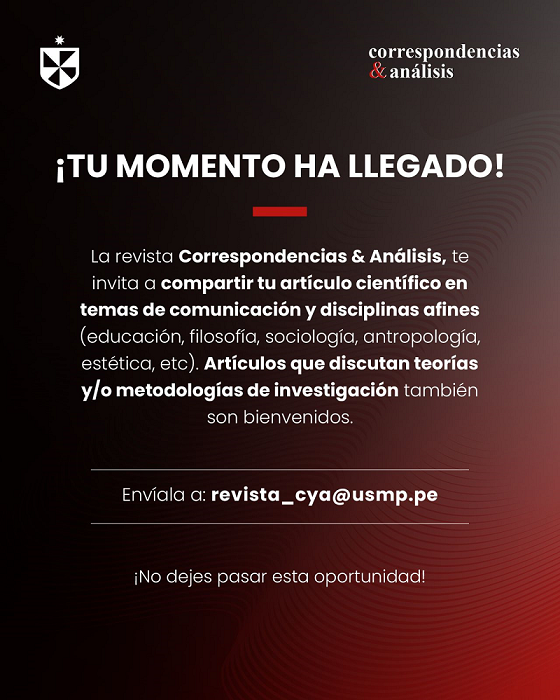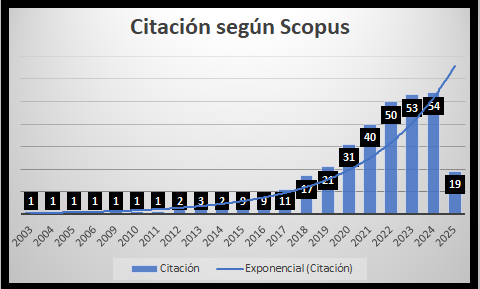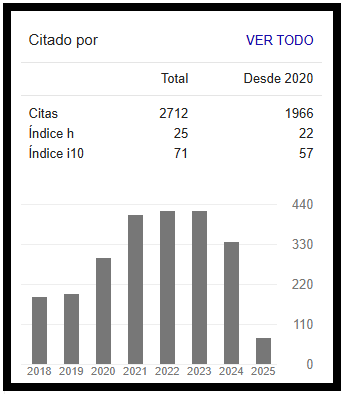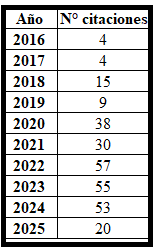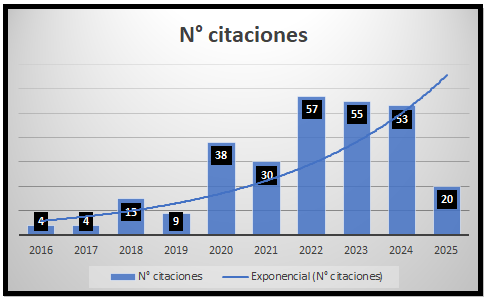The Body in Cognitive Linguistics. Conceptual Metaphor and Embodiment
DOI:
https://doi.org/10.24265/cian.2017.n7.11Keywords:
Cognitive Linguistics, Metaphor, EmbodimentAbstract
The present work approaches the way in which Cognitive Linguistics addresses the issue of the body in relation to language, which is understood as a correlate of thought. One of the axes of language addressing that characterizes this theoretical approach is the notion of conceptual metaphor postulated by Lakoff and Johnson (2001). These authors conceive metaphor as a phenomenon of thought that is reflected in language, is omnipresent in everyday life and allows the structuring of experience. The experience to which they refer is essentially corporal. The influence of body experience in conceptualizing is called embodiment or embodied mind (Lakoff, 1987: 12).
Metrics
Downloads
References
Company Company, C. (2003) “¿Qué es un cambio lingüístico?”. En: Colombo, F. y Soler, M. (coord.). Cambio lingüístico y normatividad. México: UNAM. 13-33.
Cuenca, M./Hilferty, J. (1999). Introducción a la Lingüística Cognitiva. Barcelona: Ariel.
Echeverría Arriagada, C. (2012) “Hacia el estudio crítico de la variación y el cambio lingüísticos”. Bajo Palabra. 7(2), 565-573.
Elvira, J. (2009). Evolución lingüística y cambio Sintáctico. Peter Lang.
Frank-Job, B. (2010). “Cambio lingüístico y variación lingüística: Sobre el signficado de las tradiciones discursivas para la investigación del cambio lingüístico”. En: Gallegos-Shibya, A. y Iturrioz Leza, J. (eds.). Tradiciones discursivas. Guadalajara: Universidad de Guadalajara.
Fundéu BBVA (2014). Selfi, palabra del año para la Fundéu BBVA. Disponible en: http://www.fundeu.es/recomen-dacion/selfi-palabra-del-ano-para-la-fundeu-bbva/ [Consulta: 20/04/2015].
Gallegos Shibya, A. (2003). Nominalización y registro técnico. Algunas relaciones entre morfopragmática, tradiciones discursivas y desarrollo de la lengua en español. Friburgo: Universidad de Friburgo. Tesis doctoral. Disponible en: http://www.freidok.unifreiburg.de/volltexte/2622/pdf/Gallegos-_Shibya_Dissertation.pdf [Consulta: 15/08/13].
Geeraerts, D. (Ed.) (2006). Cognitive Linguistics: Basic Readings. Berlin: Mouton de Gruyter.
Gibbs, R. (1992). “When Is Metaphor? The Idea of Understanding in Theories of Metaphor”. Poetics Today, 4(13), 575-606.
Glenberg, A. (2010). “Embodiment as a Unifying Perspective for Psychology”. Cogn Sci, 1, 586-596.
Goschler, J. (2005). “Embodiment and Body Metaphors”. Disponible en: http://www.metaphorik.de/09/goschler.htm [Consulta: 29/06/2015].
Kabatek, J. (2005). “Tradiciones discursivas y cambio lingüístico”. Lexis, 29(2): 151-177.
Lakoff, G (1987). Women, Fire and Dangerous Things. What Categories Reveal about the Mind. Chicago: University of Chicago Press.
Lakoff G./Johnson M. (2001 [1980]). Metáforas de la vida cotidiana Introducción de J. Millán y S. Narotzky. 5a ed. Madrid: Cátedra.
Rodríguez Espiñeira, M./Pena Seijas, J. (eds.) (2008). Categorización lingüística y límites intercategoriales. Verba: Anuario Galego de Filoloxía. Anexo. Santiago de Compostela: Servizo de Publicacións e Intercambio Científico.
Rodríguez Espiñeira, M. (ed.) (2010). Adjetivos en discurso: Emociones, certezas, posibilidades y evidencias. Santiago de Compostela: USC, editora. 1-29, 180-253.
Soylu, F./Brady, C./Holbert, N./Wilensky, U. (2014). “The Thinking Hand: Embodiment of Tool Use, Social Cognition and Metaphorical Thinking and Implications for Learning Design”. Paper presented at the AERA Annual Meeting (SIG: Brain, Neurosciences, and Education), Philadelphia.
Ziemke, T. (2003). “What's That Thing Called Embodiment?” En: R. Alterman y D. Kirsh (eds.). Proceedings of the 25th Annual Conference of the Cognitive Science Society. Mahwah, NJ: Lawrence Erlbaum, 1134-1139.
Downloads
Published
Issue
Section
License
In case the manuscript is approved, the authors retain the copyright and assign to the journal the right to publish, edit, reproduce, distribute, display and communicate in the country of origin and abroad by means of print and electronic media in different databases.
In order for this procedure to be recorded, the author must fill out the following formats:
Format 1 - Author data Format.
Format 2 - Affidavit on originality and authorization for the publication of articles Format.
Format 3 - Open Science Compliance.






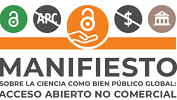

2.png)


